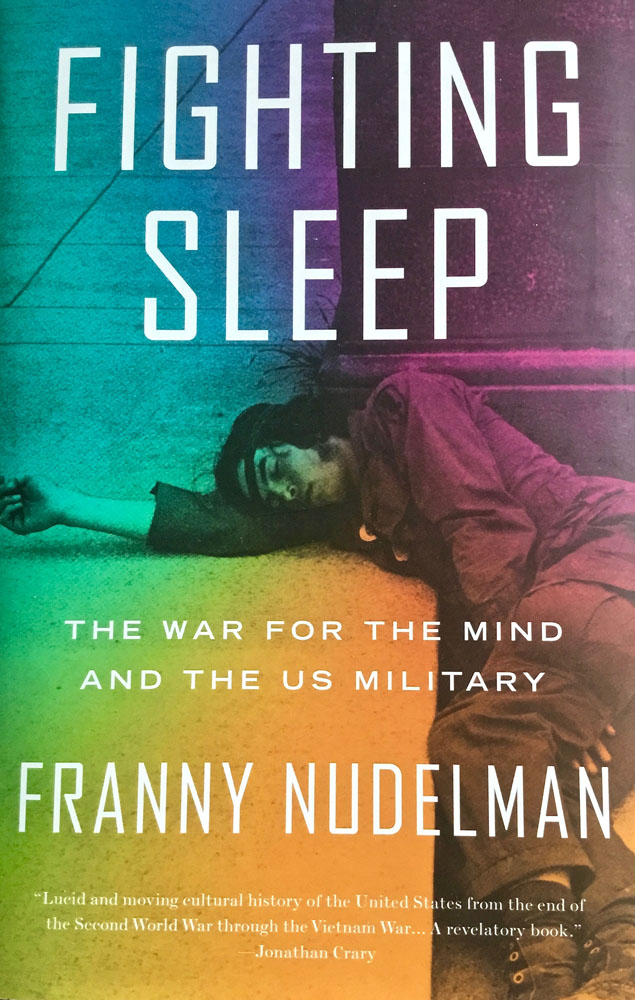 Download PDF of this full issue: v51n1.pdf (21.1 MB)
Download PDF of this full issue: v51n1.pdf (21.1 MB)From Vietnam Veterans Against the War, http://www.vvaw.org/veteran/article/?id=3965
 Download PDF of this full issue: v51n1.pdf (21.1 MB) Download PDF of this full issue: v51n1.pdf (21.1 MB) |
Fighting Sleep: The War for the Mind and the US Military
by Franny Nudelman
(Verso Books, 2019)
On November 24, 2017, Barry Romo and I met with the author at a small Mexican restaurant in Chicago. Professor Nudelman, who teaches English Language and Literature at Carleton University in Ottawa, asked for the meeting to discuss her ongoing project on sleep and war veterans. VVAW's actions in Dewey Canyon III in April 1971 were significant to her thinking. As she puts it in the opening pages,
"The VVAW sleep-in speaks powerfully in no small part because it flies in the face of a clinical and cultural record of war trauma that is rife with scenes of troubled sleep; the sleepless soldier and the insomniac veteran are protagonists of an evolving narrative of trauma and its aftermath that spans the course of the twentieth century." (p. 3)
In this slim volume, Professor Nudelman recounts a long struggle over war veterans and their sleep in the postwar world. Through a series of episodes, from World War II through to the war in Iraq, the topic of sleep became instrumental in the development of professional psychiatry, military strategy and tactics, and anti-war activism.
In the immediate aftermath of World War II, military research into sleep aided efforts to train more efficient troops. The use of sleep-related therapies was commonplace in efforts to reprogram soldiers' minds where the trauma of war hindered their performance of duty or obstructed their effective reintegration into society at war's end. Nudelman provides a long, exhaustively-researched history of the many methodologies in these efforts.
She includes a detailed history of the production and limited distribution of John Huston's 1946 film Let There Be Light and its effects on popular understanding of the returning veterans, though it was ultimately repressed by the military. The scenes of encounters between the calm, almost monotone, therapists and the half-asleep, slurring veterans would be too upsetting to the public.
Intense therapy sessions that used sleep-deprived soldiers were soon intensified by the use of narcoleptic drugs to control the sleep cycles and, at some point, even plant scenarios into the unconscious "consciousness" of these veterans. They were the guinea pigs for military efforts, first to "understand'' what happened to these traumatized soldiers, then, to find ways to better control the behavior of troops in the field.
The section on the "sleeper agent" provides a deep look at the post-Korean-era popular culture that developed around the "brainwashing" of US prisoners in North Korea. Nudelman points to the importance of the 1962 film The Manchurian Candidate as a reflection of what the military and the CIA derived from their study of these returned prisoners of war. She describes the insidious nature of government efforts at mind control within the military, and she highlights the use of sleep in this process.
Nudelman points to the character of Major Marco in the film as a precursor and a "prototype,
The final section of the book, "Experiments in Activism," covers in great detail the development of the VVAW rap groups with Robert J. Lifton, the organization and testimony at the Winter Soldier Investigation of 1971, and finally, Operation Dewey Canyon III. This is not merely historical reportage. These "events" serve to make the point that what was used for repression by the military and the government could also be used for liberation. Sleep on the Mall in DC in 1971 was a liberating event.
There is so much more packed into the 150 pages of this book I highly recommend a close reading.
Joe Miller is a Navy veteran, 1961-68. Naval Security Group, 1961-64. USS Ticonderoga (CVA14), 1964-66. HELTRARON 8, 1966-68. He is a VVAW National Board Member.

|